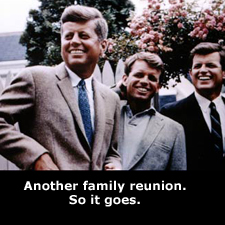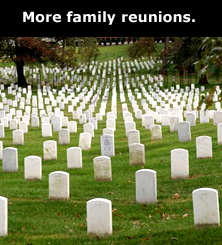I’ll admit to being of an age that enables my most vivid memories of Senator Edward Kennedy to be those of his 1980 presidential campaign. I suppose that is because presidential  politics tends to focus the mind, particularly during times of upheaval and uncertainty, which 1980 most certainly was. My late brother Mark, who passed away late that same year, took a keen interest in the campaign – he’d been a strong Kennedy supporter from his youngest days and particularly so with Robert Kennedy’s 1968 run for the Democratic presidential nomination. Mark, Matt (my Big Green compatriot) and I supported the younger Kennedy against Carter for many of the same reasons I have had for backing the more left-leaning candidates in that party since working on the McGovern campaign as a pre-teenager. But there was also that Kennedy symbolism, the notion that they represented in the minds of so many a kind of liberal ideal and inside-the-system activism strong enough to attract people who might otherwise take their place on the barricades. As far to the left as we were, we could always manage to give a Kennedy the benefit of the doubt.
politics tends to focus the mind, particularly during times of upheaval and uncertainty, which 1980 most certainly was. My late brother Mark, who passed away late that same year, took a keen interest in the campaign – he’d been a strong Kennedy supporter from his youngest days and particularly so with Robert Kennedy’s 1968 run for the Democratic presidential nomination. Mark, Matt (my Big Green compatriot) and I supported the younger Kennedy against Carter for many of the same reasons I have had for backing the more left-leaning candidates in that party since working on the McGovern campaign as a pre-teenager. But there was also that Kennedy symbolism, the notion that they represented in the minds of so many a kind of liberal ideal and inside-the-system activism strong enough to attract people who might otherwise take their place on the barricades. As far to the left as we were, we could always manage to give a Kennedy the benefit of the doubt.
Ah, the idealism of youth. Lord knows many times that faith was unwarranted. JFK was, from my personal political vantage point, a marginal president at best, and a positive disaster with respect to many of the major issues of his day. A committed cold warrior, he implemented policies that devastated South Vietnam and kept much of Latin America under the jackboot of military dictatorship, while feeding the military-industrial monster at home. His and McNamara’s policy on Vietnam was particularly craven, setting that nation up for the even greater disaster that was to come under Johnson. That’s Jack. Robert was, in some ways, a more committed cold warrior in the early days. He did seem to evolve with the decade of the sixties, becoming more a voice for civil rights and against the Indochinese war his brother helped ignite. Still, his position on the war was hardly one of pacifism, particularly in the crucial period between 1965 and 1967. Review a few of his speeches, like the one he made at St. Lawrence University in 1966, and you’ll see what I mean.
On balance, I think Ted made the greatest contribution. He ended up embodying to a certain extent the war skepticism many associated, somewhat inaccurately, with his brothers. I’m thinking particularly of Ted’s vocal opposition to the Iraq war – actually, both Iraq wars –  which put him ahead of nearly every political figure who took the podium to eulogize him at his memorial celebration in Boston’s JFK Library. In that way, and in a number of different ways over the course of his 47 years in the Senate, he amassed a record of accomplishment that makes him the head of his family, in my book. Yes, it’s a flawed legacy, one that reflects positions with which I disagree, but he took that Kennedy myth and made it into something tangible. That in itself is worth remembering. Sadly, his best efforts and ours thus far have not been sufficient to save the lives of the more than forty American service people who’ve died in Afghanistan this month alone.
which put him ahead of nearly every political figure who took the podium to eulogize him at his memorial celebration in Boston’s JFK Library. In that way, and in a number of different ways over the course of his 47 years in the Senate, he amassed a record of accomplishment that makes him the head of his family, in my book. Yes, it’s a flawed legacy, one that reflects positions with which I disagree, but he took that Kennedy myth and made it into something tangible. That in itself is worth remembering. Sadly, his best efforts and ours thus far have not been sufficient to save the lives of the more than forty American service people who’ve died in Afghanistan this month alone.
Tell you what – let’s remember him by ending these stupid wars… like, yesterday.
luv u,
jp
